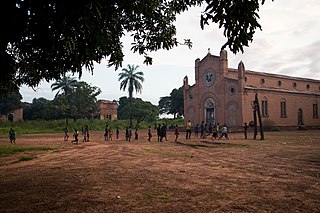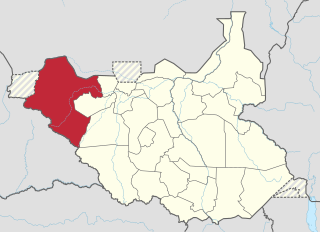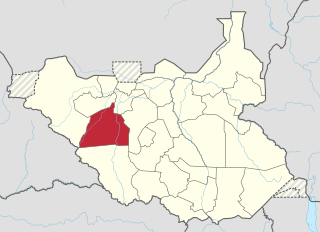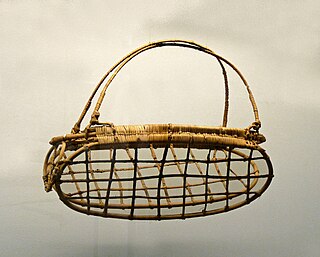Related Research Articles

The Azande are an ethnic group in Central Africa speaking the Zande languages. They live in the south-eastern part of the Central African Republic, the north-eastern part of the Democratic Republic of the Congo, and the south-central and south-western parts of South Sudan. The Congolese Azande live in Orientale Province along the Uele River; Isiro, Dungu, Kisangani and Duruma. The Central African Azande live in the districts of Rafaï, Bangasu and Obo. The Azande of South Sudan live in Central, Western Equatoria and Western Bahr al-Ghazal States, Yei, Maridi, Yambio, Tombura, Deim Zubeir, Wau Town and Momoi.

Equatoria is the southernmost region of South Sudan, along the upper reaches of the White Nile and the border between South Sudan and Uganda. Juba, the national capital and the largest city in South Sudan, is located in Equatoria. Originally a province of Anglo-Egyptian Sudan, it also contained most of northern parts of present-day Uganda, including Lake Albert and West Nile. It was an idealistic effort to create a model state in the interior of Africa that never consisted of more than a handful of adventurers and soldiers in isolated outposts.

Western Bahr el Ghazal is a state in South Sudan. It has an area of 93,900 km2 (36,255 sq mi) and is the least populous state in South Sudan, according to the controversial Sudanese census conducted in 2008. It is part of the Bahr el Ghazal region. Its capital is Wau. The state shared international borders with Sudan to the north and the Central African Republic to the west. The portion now occupied by Raga County is the southern part of the historical region known as "Dar Fertit".

Wau is a city in northwestern South Sudan, on the western bank of the Jur River, that serves as capital for Western Bahr el Ghazal. It lies approximately 650 kilometres (400 mi) northwest of the capital Juba. A culturally, ethnically and linguistically diverse urban center and trading hub, Wau is also the former headquarters of Western Bahr el Ghazal.

Deim Zubeir, from the Arabic ديم الزبير ["Daim az-Zubayr"], commonly translated as the "Camp of Zubeir", is the historically established but highly controversial name of Uyujuku town in the Western Bahr el Ghazal of the Republic of South Sudan, located in the Western Bahr El Ghazal part of the country, some 70 km from the border with the Central African Republic (CAR), near the Biri tributary of the River Chel.
The Golo or Gollo are an ethnic group living in the South Sudanese state of Western Bahr el Ghazal. The area occupied by the Gollo lies to the west of the town of Wau and is delimited by Deil Zubier (North), the source of the Mbomou River (east), the confluence of the Wara River (west) and the Kpango River (south). The most important settlements are Kayango, Abushakka, Manga.
Gbudwe Bazingbi was the Azande King in South Sudan from 1870–1905.
Joseph James Tombura was a South Sudanese politician and member of the Sudan African National Union. He was the president of the High Executive Council of the Southern Sudan Autonomous Region, serving from 23 June 1982 to 5 June 1983, until the Sudanese central government revoked the autonomy of that region. Autonomy was restored in 2005, and six years later, South Sudan became an independent nation.
The Luwo are a Nilotic ethnic group that live in the western parts of South Sudan. They are part of a larger group of ethno-linguistically related Luo peoples of East Africa. They speak the Luwo language which is a Northern Luo language.

Raga County is a county in Western Bahr el Ghazal, South Sudan. It is the largest county in the nation. In Arabic, Raga County can be known as "Raja".

The Lol State was a state of South Sudan with the capital in Raga, that existed between 2 October 2015 and 22 February 2020. It was located in the Bahr el Ghazal region, which is in the northwest section of the country. Lol state bordered Haut-Mbomou and Haute-Kotto in the Central African Republic to the west, South Darfur and East Darfur in Sudan to the north, the disputed region of Kafia Kingi to the northwest, Aweil East State to the northeast, Aweil State to the east, Gbudwe State to the south, and Wau State to the southeast. The state was created alongside 27 other states after a decree issuing the creation of 28 states took place. It was dissolved at the conclusion of the South Sudanese Civil War.

Wau State was a state in South Sudan that existed between 2 October 2015 and 22 February 2020. It was located in the Bahr el Ghazal region, and was part of the former state of Western Bahr el Ghazal. Wau State bordered Aweil State, Gbudwe State, Gogrial State, Lol State, and Tonj State.

Wau County is a county in the former state of Western Bahr el Ghazal, South Sudan. Wau County was home to the state's capital, Wau. It is the most populous county in the state with over 232,910 people.
The 2014 retreat from Western Bahr el Ghazal, also called the long march north, was an unorganized withdrawal by hundreds of Nuer Sudan People's Liberation Army (SPLA) deserters who sought to flee from Bahr el Ghazal to Sudan during the South Sudanese Civil War. After longstanding tensions between SPLA soldiers belonging to the Dinka and Nuer ethnic groups escalated on 25 April 2014, leading to a massacre of Nuer soldiers at Mapel in Western Bahr el Ghazal, a large number of Nuer SPLA soldiers deserted to escape ethnic prosecution and loyalist SPLA forces. Though some deserters joined SPLM-IO rebels or surrendered to the government, a large number of them marched northward, joined by other SPLA defectors from Northern Bahr el Ghazal. After covering over 400 kilometres (250 mi), this trek eventually arrived in Sudan on 4 August 2014, where they were disarmed.

The Greeks in South Sudan represent the Omogenia in what became the Republic of South Sudan in 2011. The population is tiny in number – estimated at around 90 – but historically played an important role and has some prominent members, especially First Lady Mary Ayen Mayardit.

The Barambu are an ethnic group who live in the northeast of the Democratic Republic of the Congo.

Frank Thomas Miller Lupton, or Lupton Bey, was a British sailor who served as an administrator in the Egyptian Sudan. He was governor of Bahr el Ghazal province in 1881 at the start of the Mahdist War. Cut off from supplies and reinforcements, he had to surrender the province in 1884. After an initial period of freedom he was enchained for ten months. He was freed but struggled to make a living, his health deteriorated and he died in poverty. He had married a local woman who survived him, as did their two daughters.
Liffi was a military station in Sudan, named after a nearby hill, and the surrounding region. It was the location of several clashes between Egyptian forces and Mahdists in the early 1880s. In 1894 the Belgians temporarily established a base there.
The Biri River is a river of South Sudan. It is a left tributary of the Kuru River, a headwater of the Lol River.

The Zande, also known as Azande Kingdom is a kingdom predominantly dominated by the Zande people or tribe. It is located in the area of Western Equatoria State of South Sudan. Its royal seat or capital is based in Yambio which is also the state capital of Western Equatoria State.